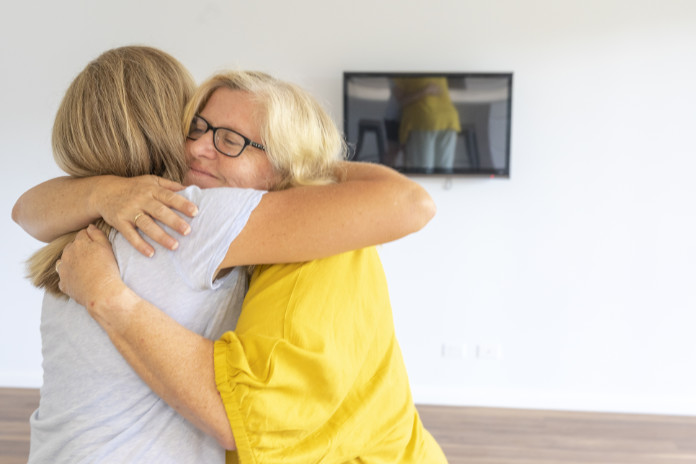When you were a kid, making friends was laughably simple – all you had to do was go up to someone in your class, share your crayons, and boom! Friends for life. Unfortunately, when you enter the real world, things become a whole lot trickier. Here are our top tips for making and keeping new friends as an adult.
As you get older, there’s a tendency for your friendship group to shrink, as people move away and you lose touch. Unlike being at school, there’s no longer a readily-available pool of potential mates, and we tend to slowly forget the art of forming friendships.

But growing up doesn’t mean you have to stop making friends. A recent study published in the Journal of Social and Personal Relationships looked into how many hours it takes to make a friend. They found it takes around 50 hours with someone before you consider them a casual friend, 90 hours before they become a friend and about 200 hours of quality time before you think of them as close. No wonder it can seem so hard to make new friends as an adult.
So how best to spend these hours to solidify a good friendship? Life coach and author of How To Be Selfish (available on Amazon), Olga Levancuka has given us her tips for how you can turn acquaintances into friends.
How to make new friends as an adult
1. Don’t rush it
Meaningful relationships take time to develop. It’s important not to go in too hard when you want to take things to the next level with an acquaintance.
“Start with low-commitment activities,” Levancuka advises. “Some people tend to be a bit hesitant about letting others into their life, regardless of how keen they are on them. Let them get used to you being a part of their life.”
She recommends starting with something small like inviting them for a drink and not forcing the issue if they’re busy, and over time, you can move on to something bigger and more regular.
2. Don’t be too eager
Let’s not lie – making a new friend as an adult is remarkably similar to the first few dates with a potential partner. And just like in love, you should try not to be too eager.
Levancuka says: “When you meet new people, be upfront with the fact that you enjoy their company, but don’t overwhelm them.” The relationship will have room to grow more organically if you take away any pressures or expectations.
3. Find common ground

“When you are able to identify similar experiences, it takes down walls between you,” Levancuka says.
This is simple but effective advice. She continues: “Not only does this provide conversation topics, but also a context for understanding each other, which will help you bridge differences.”
Levancuka says this can be anything from the very small – like a shared interest in walking – to the more meaningful – like if you both grew up without a father. Finding common ground can also provide ideas for future activities you could do together.
4. Be ready to do the work
We hate to break it to you, but relationships aren’t easy. Even though you might have gained a best friend for life within five seconds in primary school, this is rarely the case when you’re grown up. This means that you have to be willing to put in the work.
“Friendships don’t happen overnight and even though you may want to make a new friend instantly, that’s pretty much impossible,” Levancuka says.
“Put in the time to get to know someone and allow them to get to know you, but be careful not to come across as too demanding.”
5. Be a good listener

A major part of putting in the work is listening to your new friend. Levancuka advises: “If your acquaintance mentions a new book they’re reading or a movie they want to see, ask them about it the next time you see them.”
This small act of kindness can have a huge impact. Levancuka adds: “People remember when someone shows an interest in them and what they say. Remembering details and getting to know a person helps you build a relationship with them.”
6. Offer help where you can
Successful friendships are often built on a certain level of selflessness, and this can help take your relationship to the next level.
“Offer to help your friend when they need it, and use this as an opportunity to get to know each other better,” Levancuka says. “You’ll feel good about helping out and show that you have a genuine interest in what’s important to them.”
Making new friends as an adult takes a lot more commitment than making friends as a child. Adults need people to depend on, not just friends for a good time. If you can be that person, then you should have no problem making new friends as an adult.
How to mend old friendships
Olga Levancuka says: “A lot of the time you’ll be able to fix the issue by laughing it off, but depending on what happened, sometimes it may be harder to reconcile.”
If the problems between you and a friend are a bit too serious to just laugh off, take a look at Levancuka’s tips on how you can try and mend a rift in a relationship.
1. Offer the olive branch (metaphorically)
“Break the wall of silence between you. Social media has made reconnecting with someone much easier. Regardless of how annoyed or hurt you’re feeling, try and reach out to the other person.
“Use digital communication only as a first step towards repairing a relationship. It’s a good way to start the process, but to properly reconnect you need to look your friend in the eye and talk things through.”
2. Set time aside for them
“You’re less likely to be open if you’re feeling rushed or the environment isn’t right. Find time to get together and choose a location that allows you to have a quiet conversation.”
3. Ask for their side of their story
“You need to realise that your friend may not be feeling the same way as you, or they might have a different perspective. Before you assume that you know what’s bothering them, ask them how they feel and what’s caused it. First listen, and then talk.”
4. Don’t be afraid to show emotion

“You may have spent hours preparing what you want to say, but rapid-firing everything off isn’t the best way to go about it.
“Have a talk with your friend and take a moment to understand how you feel, and explain it to your friend calmly. This will make the other person less defensive and more willing to want to talk things through.”
5. Take action
“Talking things through doesn’t mean defending yourself and your actions. After you’ve both got things off your chest, commit to make changes.
“Ask each other what you can do to heal the relationship, listen to each other’s suggestions and decide how to move forward.”
6. Don’t rush things
“Mending a friendship won’t happen overnight. Accept that hurt feelings don’t heal right away, so give yourself time to digest what happened.
“If you feel you didn’t resolve everything then have another chat a week later, otherwise just let the relationship to develop naturally.”
You may also be interested in…
This article may include affiliate links to products and services where we may receive a small fee to support the running of this site if you make a purchase or is a sponsored article from one of our select editorial partners providing valuable advice and information to our readers.
































































